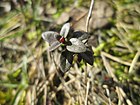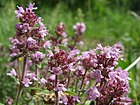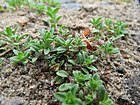Note: This is a project under development. The articles on this wiki are just being initiated and broadly incomplete. You can Help creating new pages.
Difference between revisions of "Thymus serpyllum"
| (One intermediate revision by the same user not shown) | |||
| Line 2: | Line 2: | ||
'''Thymus serpyllum''' is an evergreen shrub that can grow up to 0.10 metres tall. It is harvested from the wild for local use as a food, medicine and source of materials. | '''Thymus serpyllum''' is an evergreen shrub that can grow up to 0.10 metres tall. It is harvested from the wild for local use as a food, medicine and source of materials. | ||
==Uses== | ==Uses== | ||
| − | {{Uses|Bronchitis}}, {{Uses|Catarrh}}, {{Uses|Laryngitis}}, {{Uses|Indigestion}}, {{Uses|Painful menstruation}}, {{Uses|Colic}}, {{Uses|Hangovers}}, {{Uses|Alcoholism}}, {{Uses|Gum infections | + | {{Uses|Bronchitis}}, {{Uses|Catarrh}}, {{Uses|Laryngitis}}, {{Uses|Indigestion}}, {{Uses|Painful menstruation}}, {{Uses|Colic}}, {{Uses|Hangovers}}, {{Uses|Alcoholism}}, {{Uses|Gum infections}}.<ref name="Uses"/> |
==Parts Used== | ==Parts Used== | ||
| Line 30: | Line 30: | ||
==Habit== | ==Habit== | ||
| − | {{Habit|}} | + | {{Habit|Evergreen shrub}} |
==Identification== | ==Identification== | ||
Latest revision as of 10:41, 25 August 2020
Thymus serpyllum is an evergreen shrub that can grow up to 0.10 metres tall. It is harvested from the wild for local use as a food, medicine and source of materials.
Contents
- 1 Uses
- 2 Parts Used
- 3 Chemical Composition
- 4 Common names
- 5 Properties
- 6 Habit
- 7 Identification
- 8 List of Ayurvedic medicine in which the herb is used
- 9 Where to get the saplings
- 10 Mode of Propagation
- 11 How to plant/cultivate
- 12 Commonly seen growing in areas
- 13 Photo Gallery
- 14 References
- 15 External Links
Uses
Bronchitis, Catarrh, Laryngitis, Indigestion, Painful menstruation, Colic, Hangovers, Alcoholism, Gum infections.[1]
Parts Used
Chemical Composition
48 compounds were identified. Results showed that oxygenated monoterpenes are the major portion of all EOs samples, with highest content observed in T. algeriensis (74.61%), and similar content in T. speryllum and T. vulgaris (54.49% and 58.11%, respectively). [2]
Common names
| Language | Common name |
|---|---|
| Kannada | |
| Hindi | |
| Malayalam | |
| Tamil | |
| Telugu | |
| Marathi | |
| Gujarathi | |
| Punjabi | |
| Kashmiri | |
| Sanskrit | |
| English |
Properties
Reference: Dravya - Substance, Rasa - Taste, Guna - Qualities, Veerya - Potency, Vipaka - Post-digesion effect, Karma - Pharmacological activity, Prabhava - Therepeutics.
Dravya
Rasa
Guna
Veerya
Vipaka
Karma
Prabhava
Habit
Identification
Leaf
| Kind | Shape | Feature |
|---|---|---|
Flower
| Type | Size | Color and composition | Stamen | More information |
|---|---|---|---|---|
| {{{5}}} |
Fruit
| Type | Size | Mass | Appearance | Seeds | More information |
|---|---|---|---|---|---|
Other features
List of Ayurvedic medicine in which the herb is used
Where to get the saplings
Mode of Propagation
Seeds, Cuttings of young shoots, Cuttings of half-ripe wood, Air layering.
How to plant/cultivate
Requires a light well-drained preferably calcareous soil in a sunny position. Succeeds in dry soils. Grows well between stepping stones on paths, tolerating light treading.[4]
Commonly seen growing in areas
Dry stony ground, Open sandy heaths.
Photo Gallery
References
- ↑ Indian Medicinal Plants by C.P.Khare
- ↑ Chemical constituents
- ↑ [Morphology]
- ↑ Cultivation
External Links
- Ayurvedic Herbs known to be helpful to treat Bronchitis
- Ayurvedic Herbs known to be helpful to treat Catarrh
- Ayurvedic Herbs known to be helpful to treat Laryngitis
- Ayurvedic Herbs known to be helpful to treat Indigestion
- Ayurvedic Herbs known to be helpful to treat Painful menstruation
- Ayurvedic Herbs known to be helpful to treat Colic
- Ayurvedic Herbs known to be helpful to treat Hangovers
- Ayurvedic Herbs known to be helpful to treat Alcoholism
- Ayurvedic Herbs known to be helpful to treat Gum infections
- Herbs with Leaves used in medicine
- Habit - Evergreen shrub
- Index of Plants which can be propagated by Seeds
- Index of Plants which can be propagated by Cuttings of young shoots
- Index of Plants which can be propagated by Cuttings of half-ripe wood
- Index of Plants which can be propagated by Air layering
- Herbs that are commonly seen in the region of Dry stony ground
- Herbs that are commonly seen in the region of Open sandy heaths
- Herbs






